Introduction: Why Finding Unbiased Political Podcasts is Critical
In this modern era, It’s more important than ever to find unbiased political podcasts. With the rise of misinformation and political spin, many people struggle to find reliable sources for news. Media outlets often have agendas, and it’s hard to know if the information they provide is fair.
This is where unbiased political podcasts come in. These podcasts aim to provide balanced views, making it easier for people to form their own opinions based on facts rather than emotions or manipulated narratives.
By following an unbiased political podcast, listeners can get the full picture. They won’t just hear one side of the story but instead receive information from a range of perspectives. This makes political podcasts a valuable tool in an era when bias can easily skew public opinion.
In a world that feels increasingly divided, staying informed through fair and neutral sources can help bring back balanced thinking. It’s not just about staying current with politics; it’s about getting the truth without unnecessary drama.
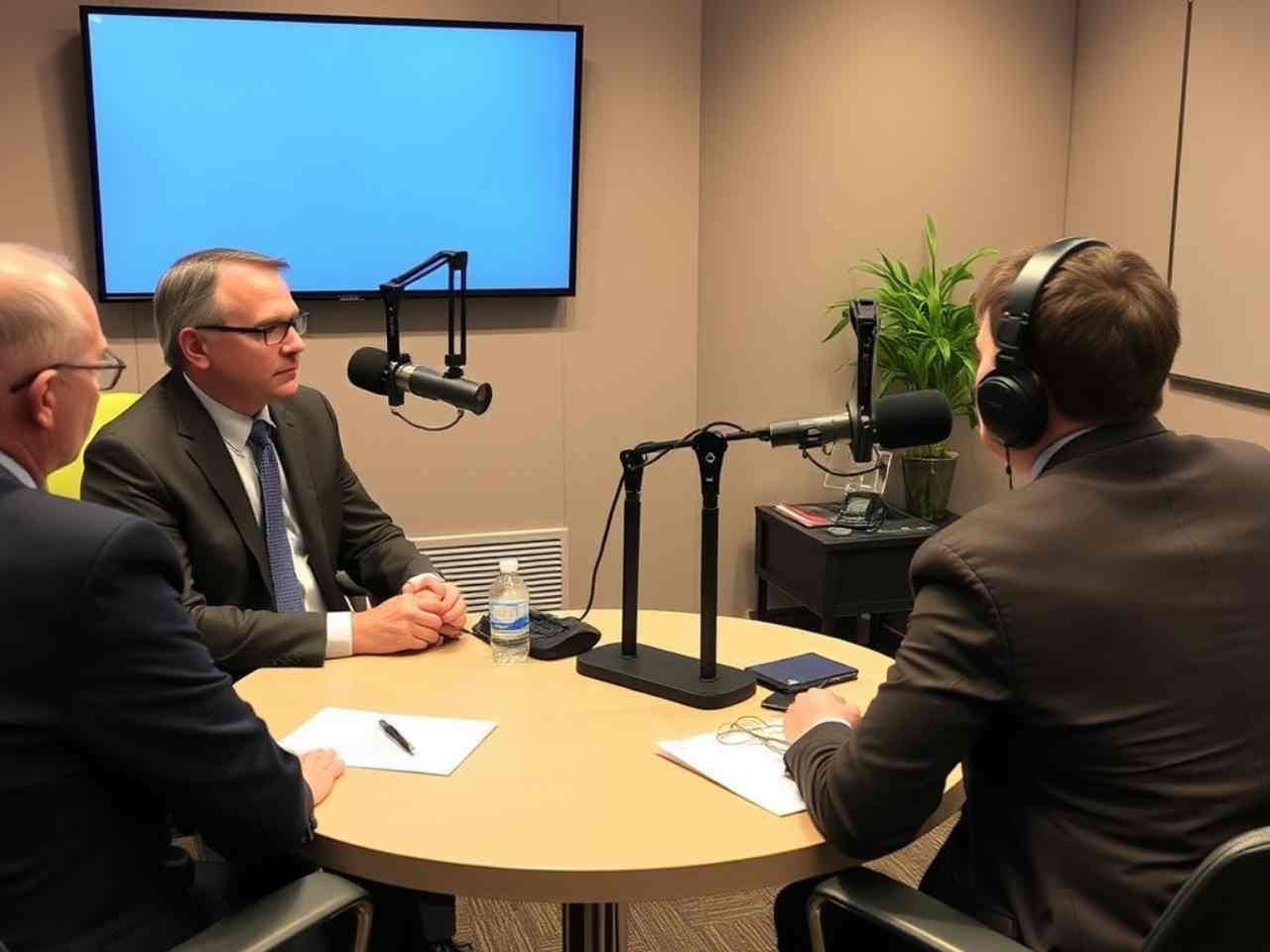
How to Identify a Truly Unbiased Political Podcast
1. Understanding Bias in Media
Media bias is something everyone needs to understand. Almost every media source has some level of bias, whether they intend to or not. Bias happens when a news source pushes a certain view or ignores important facts to make their point seem stronger.
Sometimes, this bias is obvious, like when a political podcast only invites guests from one side of the argument. Other times, it’s subtle, such as when certain words are used to influence how listeners feel about an issue.
An unbiased political podcast tries its best to avoid these tricks. It presents facts clearly and doesn’t steer listeners toward a specific conclusion. By focusing on facts and multiple viewpoints, these podcasts aim to provide a fuller, more accurate picture.
In today’s political climate, it’s easy to be swayed by emotionally charged news. But the key to staying informed is to recognize these biases and look for podcasts that stick to the facts without trying to persuade.
2. Spotting Red Flags
Spotting bias in political podcasts can be tricky, but there are some clear signs. One red flag is when a podcast only features guests or topics from one side of the political spectrum. If the hosts never question or challenge their guests’ opinions, that’s a good sign the podcast might not be as neutral as it seems.
Another warning sign is when a podcast uses overly dramatic or emotional language. Words that evoke strong feelings like “disaster” or “crisis” are often used to make listeners react rather than think critically. If a podcast constantly uses these tactics, it’s probably not unbiased. Podcasts that stick to the facts and avoid sensationalism are more likely to provide balanced political news.
Finally, be cautious of podcasts that always blame one political party for every issue. An unbiased political podcast will examine problems from all angles and won’t assign blame without considering every viewpoint. Look for podcasts that give credit where it’s due and criticize when necessary, no matter which party is involved.
3. What Makes a Podcast ?
Several factors set unbiased political podcasts apart from the rest. First, they have balanced discussions. They feature guests from all sides of an issue and allow everyone to share their thoughts without pushing an agenda. This gives listeners a chance to hear different perspectives and make up their own minds.
Second, these podcasts rely on verified information. They don’t share rumors or unverified claims. Instead, they focus on data, studies, and expert opinions. This ensures that listeners get facts, not just opinions.
Lastly, unbiased political podcasts avoid emotional manipulation. They don’t use scare tactics or try to make people angry just to get more listeners. Instead, they keep the tone calm and focus on thoughtful discussion. This approach helps listeners stay informed without feeling overwhelmed or stressed.
In short, unbiased political podcasts focus on delivering facts, feature balanced guests, and avoid unnecessary drama. This makes them a great resource for anyone who wants to stay informed in a fair and balanced way.
Why Podcasts Are the Go-To for Political News
1. Podcasts vs. Traditional Media
Podcasts have become a popular choice for political news, and for good reasons. Traditional media, like TV news or newspapers, often gives short and surface-level information. They usually focus on headlines and quick soundbites to keep people’s attention, but they don’t always dive deep into the issues.
Podcasts, on the other hand, give more time to explain things in detail. Instead of rushing through the news, political podcasts take the time to break down complex topics, giving listeners a better understanding of what’s really happening.
Another big difference is the flexibility podcasts offer. People can listen to them whenever and wherever they want. You don’t need to sit down in front of a TV at a specific time.
Whether you’re driving, walking, or doing chores, you can always catch up on the latest political news. This convenience is a huge reason why podcasts are beating traditional media when it comes to staying informed.
2. The Rise of Political Podcasts
Political podcasts have been growing fast in recent years. More and more people are turning to them to get their news. One reason for this rise is that listeners feel they can trust podcast hosts. Podcasts often feature long, thoughtful conversations rather than just quick interviews or debates. This format helps people get the full picture, not just a soundbite. The audience gets to hear different viewpoints, which gives them a clearer idea of what’s going on.
Another reason political podcasts are booming is because people are tired of biased news. Many traditional media outlets lean heavily toward one side or the other. But unbiased political podcasts aim to give a balanced view. They focus on facts and avoid pushing any political agenda, which is refreshing for listeners who just want the truth.
3. Appeal of Unbiased Political Podcasts
Unbiased political podcasts stand out because they offer something rare: fair and balanced discussions. These podcasts invite guests from across the political spectrum, ensuring that every side of an issue is heard. Listeners can hear arguments for and against policies, helping them make informed decisions without being swayed by emotional bias.
People also like these podcasts because they are more relaxed and less dramatic. Unlike traditional media, which often tries to get a reaction with flashy headlines or intense debates, unbiased political podcasts keep things calm and focused. This approach makes it easier for listeners to digest information without feeling overwhelmed or manipulated.
The Top 10 Best Unbiased Political Podcasts You Should Follow
1. FiveThirtyEight Politics
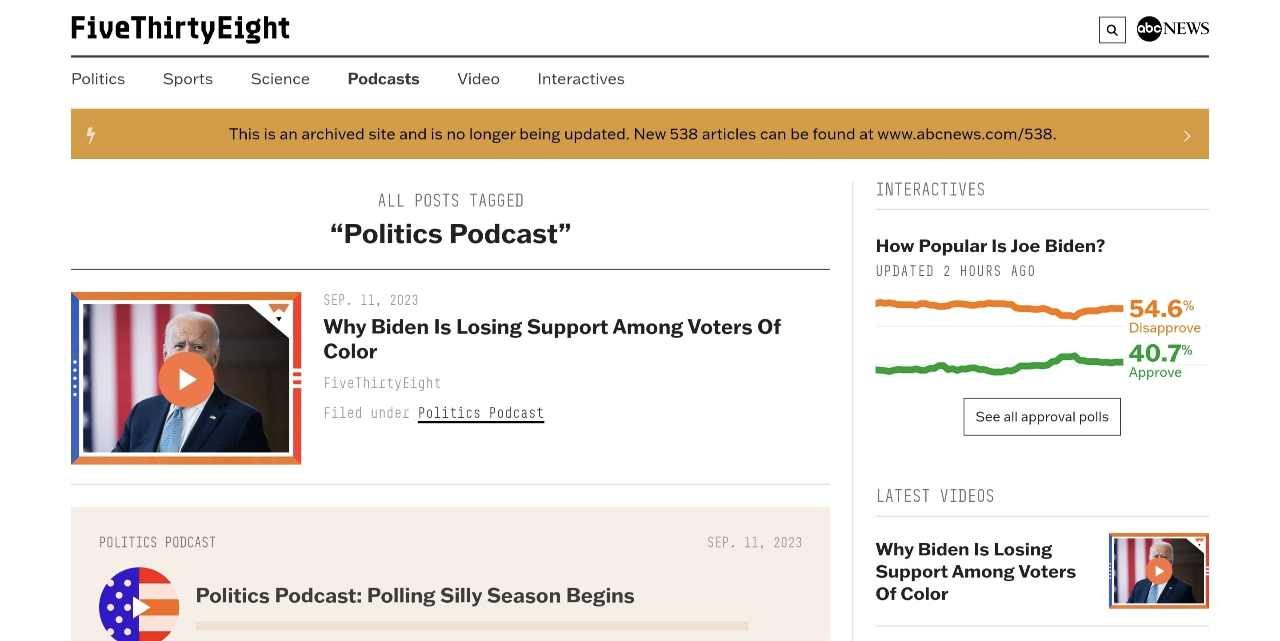
The FiveThirtyEight Politics podcast is led by a team of skilled political analysts who dive deep into U.S. politics, elections, and polling data. The show is hosted by Nate Silver, the founder of FiveThirtyEight and a well-known statistician, alongside Galen Druke and Kaleigh Rogers.
Together, they break down complex political topics with a mix of data-driven analysis and thoughtful commentary.
The podcast focuses on interpreting political trends, forecasting election outcomes, and offering insightful discussions on how statistical models relate to current political events. Whether it’s dissecting polling data or exploring election results, their approach provides listeners with a clear, analytical view of the political landscape.
2. The Political Gabfest
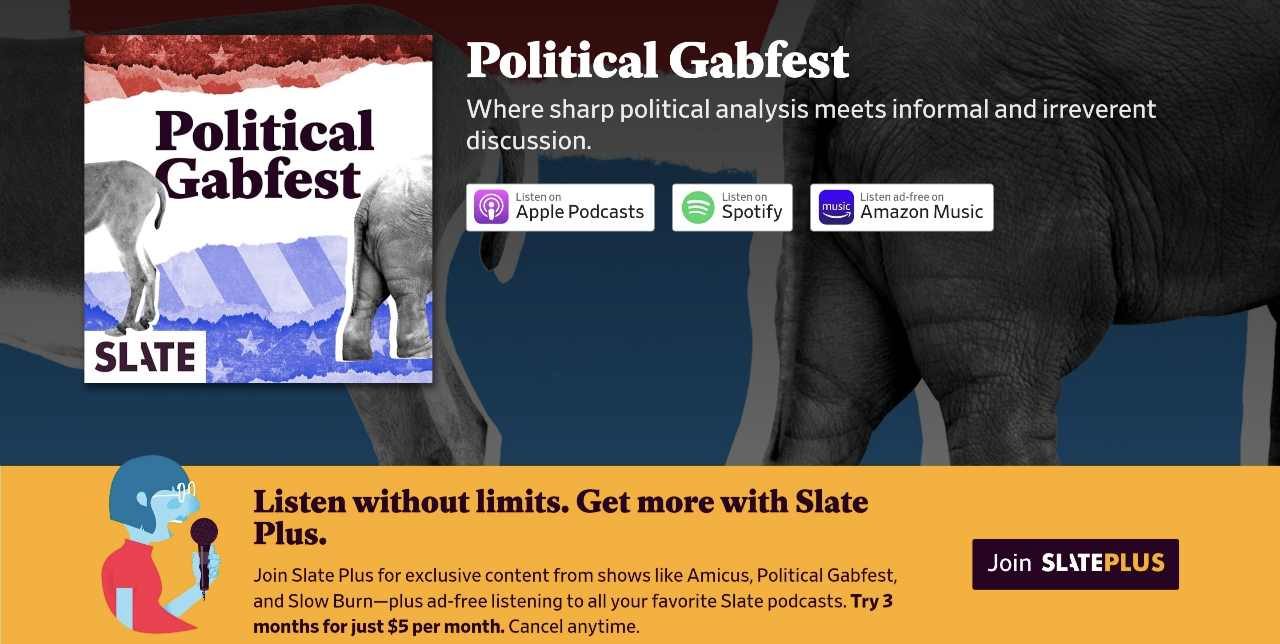
The Political Gabfest is a long-running podcast that offers in-depth and often lively discussions on the most important political issues of the day. The show is hosted by three well-known journalists: Emily Bazelon, a law professor and staff writer for The New York Times Magazine; John Dickerson, a correspondent for CBS News; and David Plotz, the CEO of City Cast.
Together, they bring years of journalistic expertise to each conversation, creating a dynamic mix of perspectives. Known for its casual, unscripted format, the podcast often features debates and analysis on current events, offering listeners a chance to hear thoughtful opinions from different angles. Since its launch in 2005, this Slate-produced podcast has been a favorite for political junkies looking for in-depth yet conversational coverage.
You Might Like To Read: 9 Secrets Revealed How to Be a Great Podcast Host
3. Breaking Points

Breaking Points is a popular podcast hosted by Krystal Ball and Saagar Enjeti, who offer a unique mix of progressive and conservative viewpoints. Their goal is to provide honest, independent commentary that challenges mainstream media narratives.
Krystal, a progressive political commentator, and Saagar, a conservative analyst, have earned a reputation for calling out bias in traditional media, providing their listeners with fresh takes on political issues from both sides of the spectrum. The podcast focuses on covering stories that they feel are underreported or misrepresented by major news outlets, making it a go-to for listeners who want to hear political analysis that avoids sensationalism and tackles topics head-on.
4. PBS NewsHour – Politics Monday
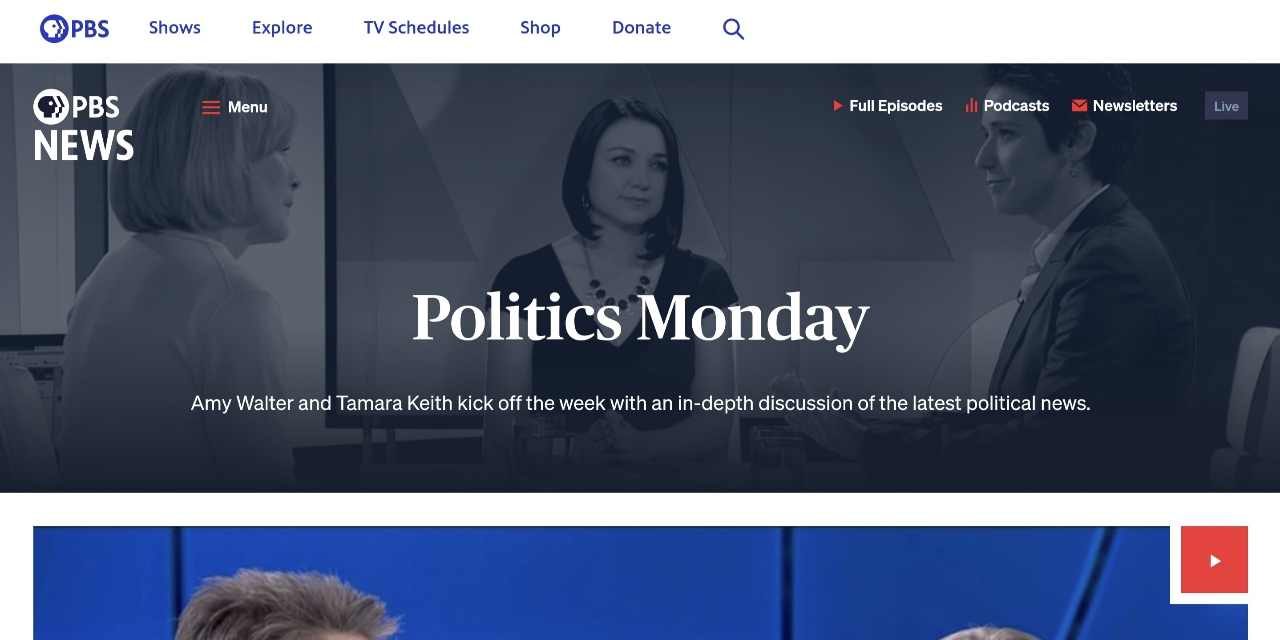
The PBS NewsHour – Politics Monday podcast is co-hosted by Amy Walter and Tamara Keith, two seasoned political analysts who bring a wealth of experience to their discussions. Amy Walter is the national editor for The Cook Political Report and known for her deep insights into political polling and election trends.
Tamara Keith, a White House correspondent for NPR, adds her perspective from covering national politics up close. Together, they analyze the week’s top political stories, focusing on how current events shape the political landscape in the U.S. Their conversations offer listeners a clear, fact-based understanding of the most pressing political issues of the moment, with an emphasis on helping people navigate complex political news.
5. The Skepticrat
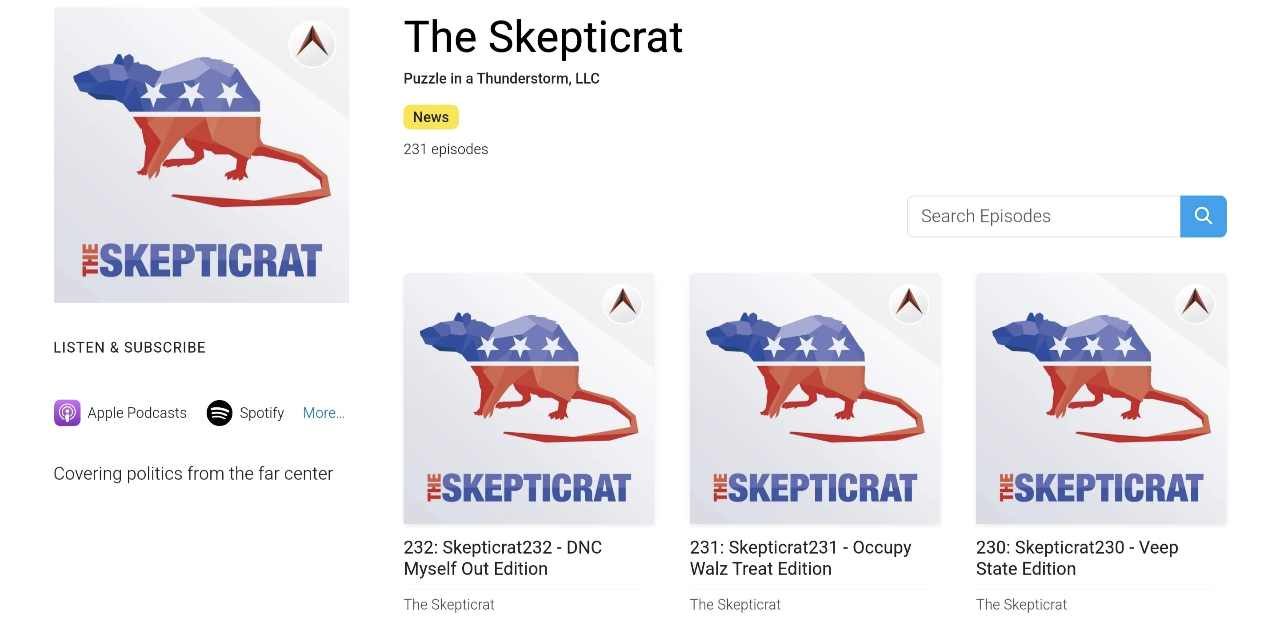
The Skepticrat is a unique blend of political commentary and comedy, hosted by Eli Bosnick, Noah Lugeons, and Heath Enwright. Known for their sharp wit and humorous take on current events, these hosts provide centrist political analysis with plenty of sarcasm and humor. The podcast covers both U.S. and global political issues, and its light-hearted approach makes serious topics more accessible.
Each episode breaks down recent news in an entertaining format, while still giving listeners an insightful look at political happenings. The Skepticrat is perfect for those who want to stay informed but prefer a podcast that doesn’t take itself too seriously.
You Might Like To Read: 17 Best Podcast Production Companies To Boost Your Brand Success
6. The Congressional Dish
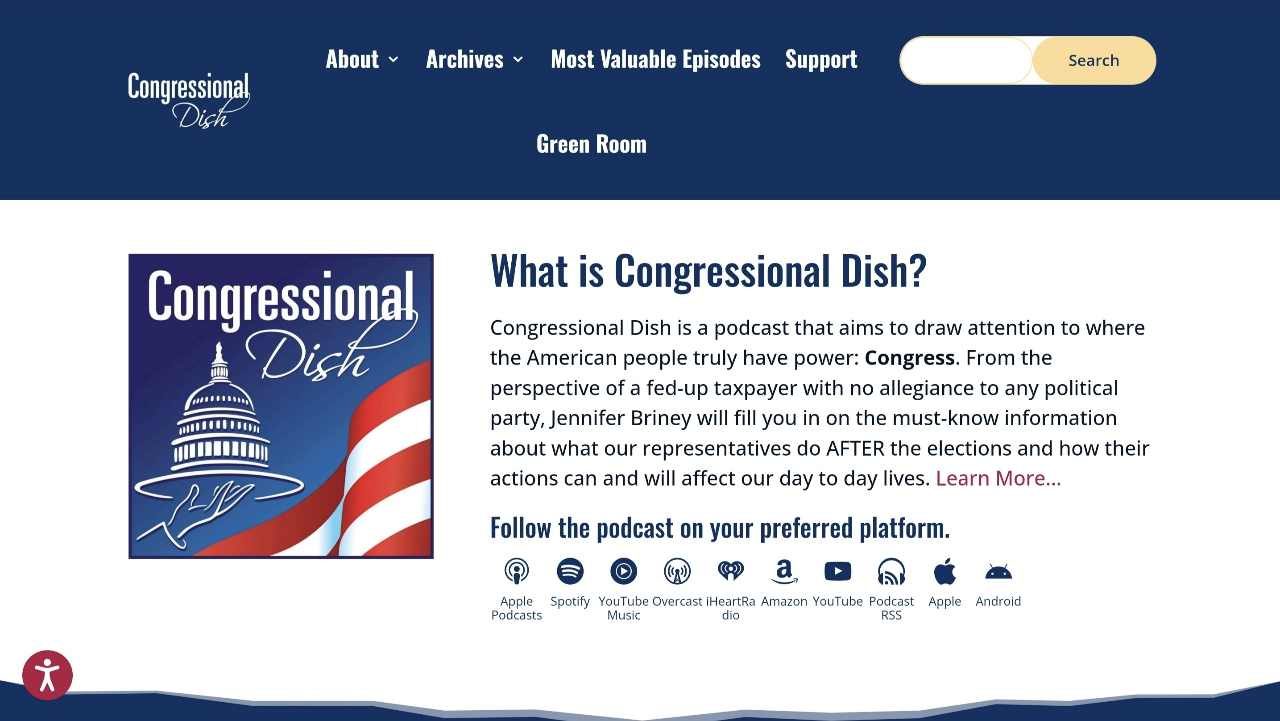
The Congressional Dish is hosted by Jen Briney, who has carved out a niche in the political podcasting world by focusing on the inner workings of the U.S. Congress. Unlike many other political podcasts, The Congressional Dish zeroes in on legislation and the legislative process, making it an invaluable resource for those looking to understand how laws and bills impact everyday life.
Jen Briney reads the bills that pass through Congress, explains their contents, and sheds light on the policies that often go unnoticed by the mainstream media. Her dedication to transparency and accountability makes this podcast essential listening for anyone wanting to know what’s really happening in Washington, D.C.
7. Left, Right & Center
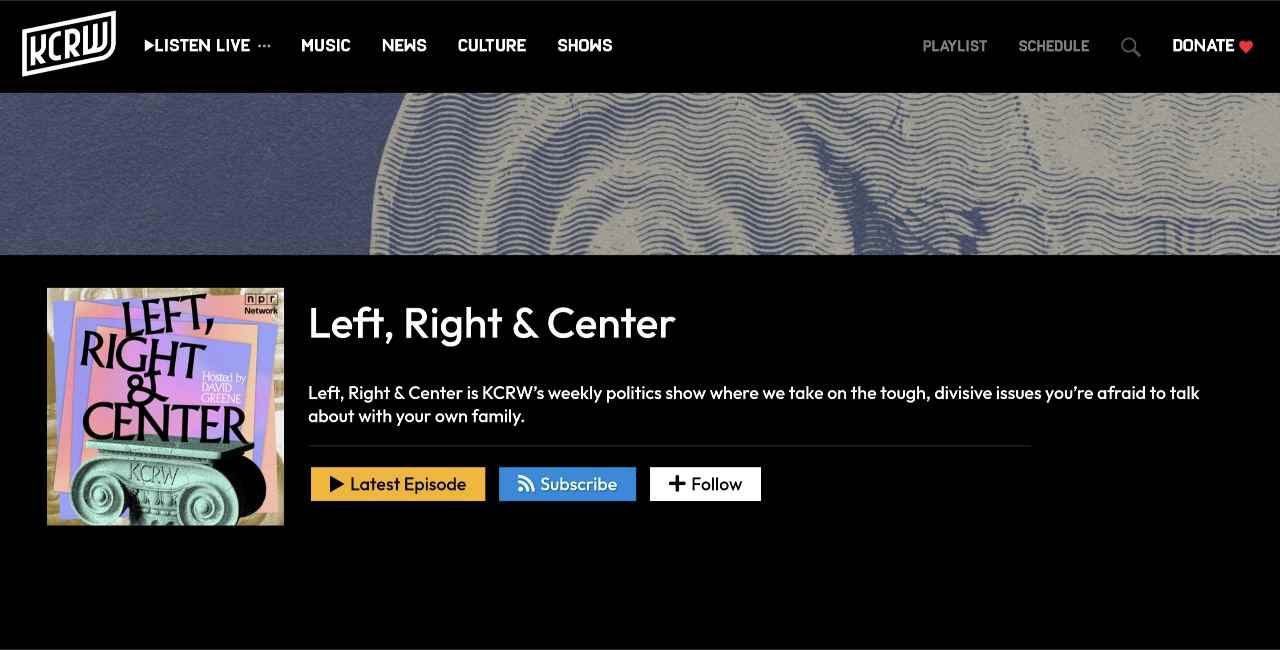
Left, Right & Center is a political debate podcast that encourages civil discourse on today’s most polarizing issues. The show features a rotating panel of hosts, including Josh Barro, a centrist political commentator; Rich Lowry, the editor of National Review representing the right; and Mona Charen, a conservative columnist and podcast host. Tami Abdollah of KCRW represents the left in this balanced exchange of viewpoints.
What makes Left, Right & Center stand out is its commitment to giving all sides of the political spectrum a fair voice. Each episode invites healthy debates on key political issues, allowing listeners to hear arguments from across the ideological divide, which makes it a great podcast for anyone interested in gaining a balanced perspective on today’s political climate.
8. Pod Save America
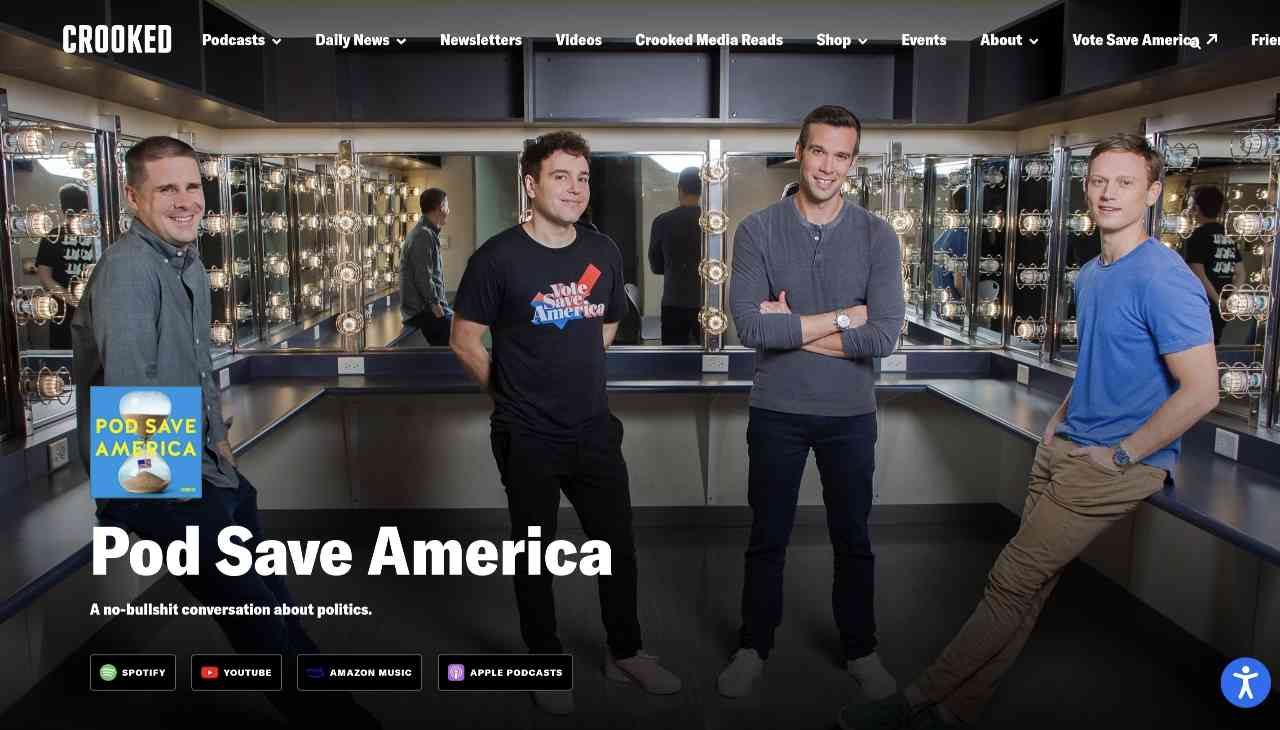
Pod Save America is one of the most popular liberal political podcasts, hosted by former Obama aides Jon Favreau, Jon Lovett, Dan Pfeiffer, and Tommy Vietor. These four co-hosts, with their insider experience from working in the White House, offer listeners candid discussions on the current political landscape. Launched by Crooked Media in January 2017, Pod Save America became a go-to platform for progressive political commentary.
The podcast blends humor with serious discussions, addressing significant political events and challenges facing the U.S. Guests such as politicians, journalists, and activists often join to provide additional insight.
Pod Save America airs three times a week and encourages listeners to not just stay informed but to get involved in political activism. Its conversational style and commitment to progressive ideals make it a popular choice for those looking for both entertainment and political engagement.
9. The Majority Report with Sam Seder
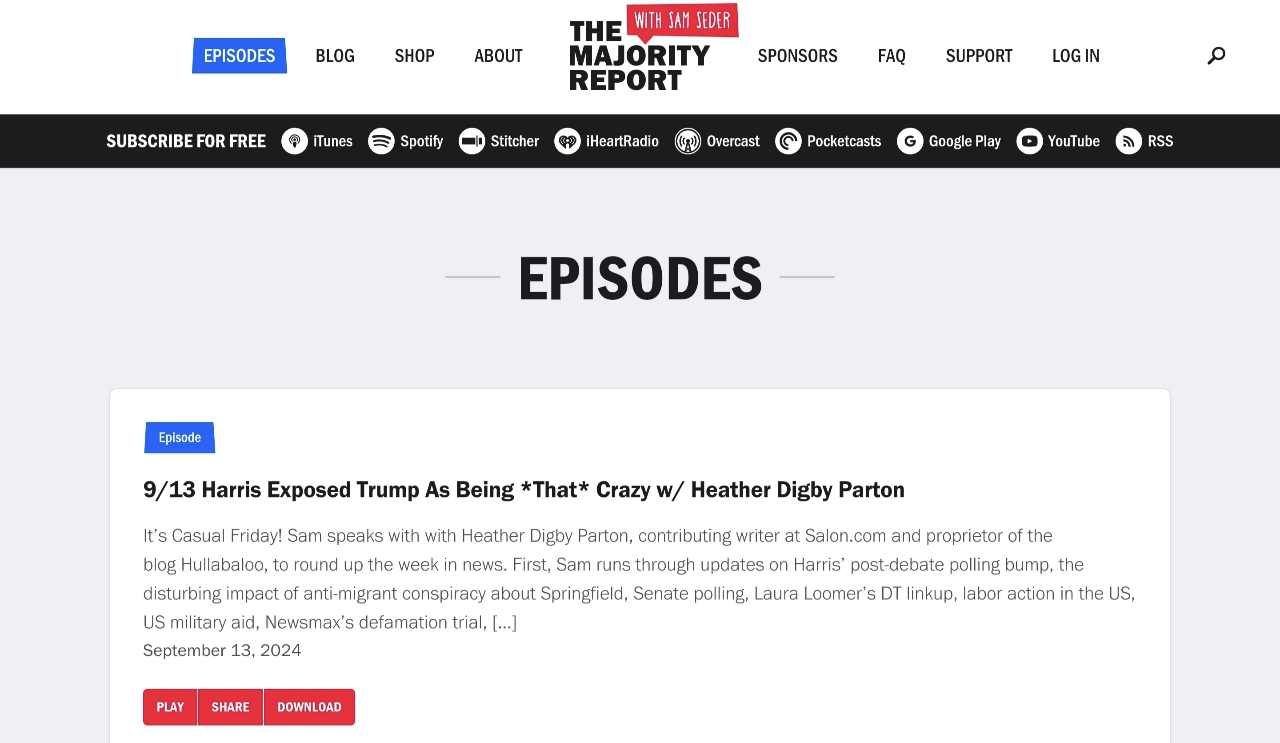
Hosted by Sam Seder, The Majority Report is a long-running progressive political talk show that covers a broad spectrum of issues including social justice, economic inequality, and current events.
Seder, a comedian and political commentator, brings a sharp and informed perspective to the show, mixing humor with serious political analysis. The podcast is known for its deep dives into leftist ideology and advocacy for progressive causes.
Each episode features in-depth interviews with various guests ranging from politicians to activists and scholars. Since its start in 2004, The Majority Report has built a loyal following among those looking for rigorous progressive discussions that challenge mainstream media narratives.
Seder’s interviewing style often allows for thorough exploration of complex political topics, making it a valuable resource for listeners who want a nuanced understanding of key issues.
10. The Axe Files
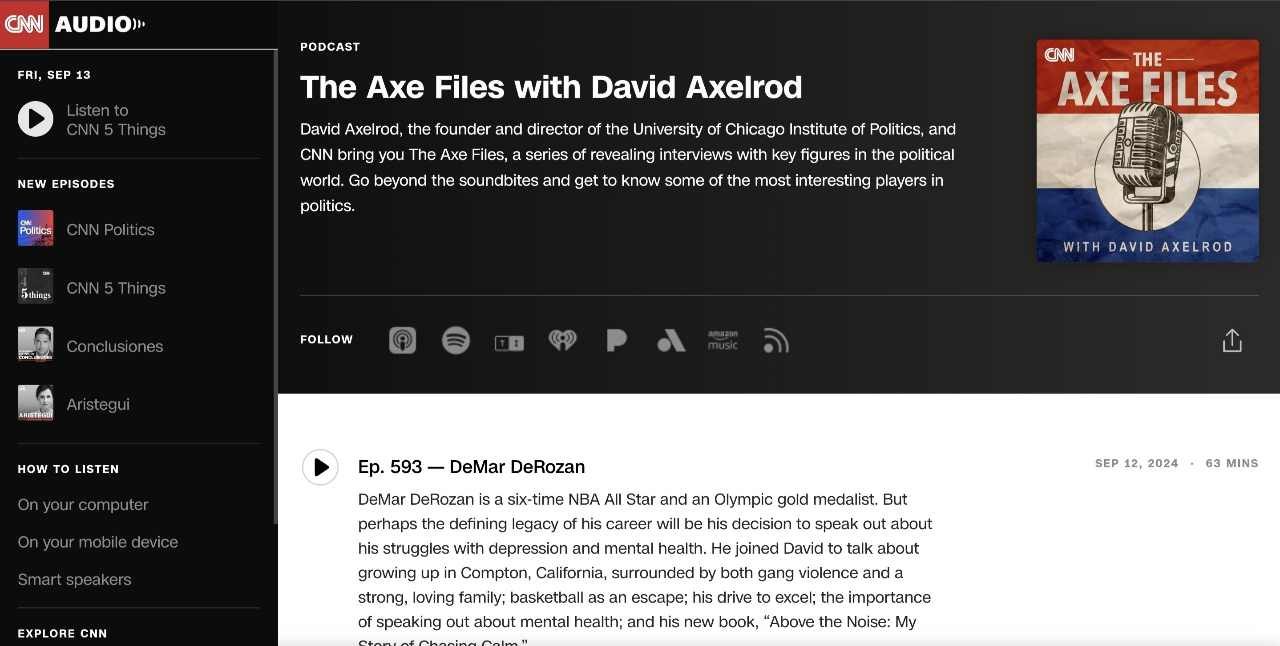
Hosted by David Axelrod, a former senior advisor to President Obama, The Axe Files offers a unique blend of political storytelling and deep-dive interviews with some of the most influential figures in politics, journalism, and public life.
Axelrod’s background as a political strategist gives him an insider’s perspective, which allows him to have insightful, thoughtful conversations with his guests. The podcast goes beyond just current events; it often explores the personal journeys of political figures, offering listeners a more human side of politics.
Guests include high-profile politicians, journalists, and thought leaders who share their experiences, challenges, and views on the political landscape. Axelrod’s interviewing style is calm and reflective, giving space for meaningful discussions, and making The Axe Files a great choice for listeners who appreciate thoughtful, in-depth conversations that go beyond the daily news cycle.
What to Expect from an Unbiased Political Podcast
1. Balanced Perspectives
One thing listeners can always expect from an unbiased political podcast is balanced perspectives. These podcasts make sure to bring in voices from all sides of an issue. Whether it’s a debate about taxes, healthcare, or foreign policy, the goal is to provide different viewpoints so listeners can form their own opinions.
They won’t just hear one party’s stance; they’ll hear arguments from every angle. This balanced approach makes these podcasts more informative and trustworthy.
2. Data-Driven Discussions
Another key feature of unbiased political podcasts is their focus on data. Instead of just talking about opinions or emotions, they bring real numbers and studies into the discussion. Hosts and guests rely on verified data to back up their points.
This helps listeners understand the facts behind political issues, rather than getting caught up in spin or rhetoric. Data-driven discussions allow people to see the bigger picture and make decisions based on solid evidence, not just what sounds good.
3. Deep Dives into Policy, Not Politics
Unlike traditional media, which often focuses on the latest political drama, unbiased political podcasts take deep dives into policies. Instead of just reporting on who said what, these podcasts explain how certain policies will affect everyday life.
They break down complex topics, such as healthcare reform or climate change, and help listeners understand the details behind political decisions. This way, listeners get a clearer idea of what’s at stake without all the noise of political bickering.
4. Avoiding Sensationalism
Unbiased political podcasts don’t rely on sensationalism to keep their audience’s attention. Sensationalism, which is when media exaggerates or dramatizes news, is common in traditional media. But these podcasts avoid using fear or outrage to get listeners hooked. They stick to the facts and avoid overhyping issues.
This creates a more relaxed listening experience, where people can get informed without feeling manipulated or pressured. It’s one of the main reasons why many listeners trust these podcasts over traditional news outlets.
How Listening to Unbiased Political Podcasts Benefits You
1. Stay Informed Without Bias
Listening to unbiased political podcasts helps people stay informed without being influenced by one-sided opinions. Many news sources these days push their own views, making it hard to know what’s really happening. But unbiased political podcasts aim to present facts from different angles.
They don’t push a specific agenda or try to convince listeners of a particular stance. Instead, they focus on delivering balanced information. This allows people to get a clearer, more accurate picture of political events, helping them form their own opinions based on the full story, not just one version of it.
2. Improves Critical Thinking
When people listen to unbiased political podcasts, it encourages critical thinking. By hearing multiple perspectives on the same issue, listeners are forced to think about why certain people believe what they do.
This process helps them analyze and question the information they receive. Rather than simply accepting one viewpoint as the truth, they learn to think deeper and weigh the pros and cons of different arguments. This skill is valuable, not just in politics, but in everyday life when making important decisions.
3. Reduces Echo Chamber Effects
One of the biggest problems with modern media is the echo chamber effect. This happens when people only hear opinions they already agree with, reinforcing their beliefs without ever challenging them. Unbiased political podcasts help break this cycle.
They expose listeners to different viewpoints, even those they might not usually agree with. This broadens their perspective and makes them more open-minded. By hearing diverse opinions, people can understand opposing views better and avoid getting trapped in a bubble where they only hear what they want to hear.
4. Stay Ahead of Major Political Issues
Another benefit of unbiased political podcasts is staying ahead of major political issues. These podcasts often cover topics in more depth than traditional media. They discuss the long-term effects of policies and decisions, which helps listeners understand how these changes could affect their lives.
By staying informed through unbiased podcasts, people can be better prepared for what’s coming next in politics. This makes them more knowledgeable and proactive, rather than just reacting to news as it happens.
Comparing Unbiased Political Podcasts with Other News Sources
1. Podcasts vs. Cable News
Unbiased political podcasts offer a different experience compared to cable news. Cable news is often focused on fast-paced headlines and breaking news, which can sometimes feel rushed. It’s also common for cable news channels to have their own political leanings, which can lead to biased coverage.
In contrast, podcasts take the time to explore topics in detail. They aren’t as concerned with getting the first scoop, which means they can focus on accuracy and depth. This allows listeners to get a more thoughtful, well-rounded understanding of political issues without the constant pressure of breaking news.
2. Podcasts vs. Social Media
Social media is another popular source for political news, but it comes with a lot of problems. The main issue with social media is that it’s filled with opinions, rumors, and unverified information. People often share stories without checking their accuracy, and this can lead to the spread of false news.
Unbiased political podcasts, on the other hand, rely on verified facts. They avoid sensationalism and focus on giving listeners reliable, balanced information. This makes podcasts a more trustworthy source for political news than social media, where it’s easy to get misled by exaggerated or incorrect information.
3. The Podcast Advantage
Overall, the advantage of listening to unbiased political podcasts is the combination of depth, balance, and flexibility. Unlike cable news, which often skims the surface of important issues, podcasts take the time to explore topics thoroughly. And compared to social media, podcasts are more reliable because they stick to facts and avoid emotional manipulation.
Plus, with podcasts, people can listen whenever it’s convenient for them, making it easier to stay informed on the go. This mix of balanced perspectives, data-driven discussions, and accessibility makes unbiased political podcasts a great choice for anyone looking to stay informed in a clear and honest way.
How to Get the Most Out of Unbiased Political Podcasts
1. Curating a Balanced Playlist
To get the most out of unbiased political podcasts, it helps to create a balanced playlist. Don’t just listen to podcasts that align with your own views. Instead, include podcasts that represent a variety of perspectives.
This way, you can hear different sides of the same issue, which gives you a more well-rounded understanding. By mixing viewpoints, you avoid the risk of falling into an echo chamber, where you only hear what you agree with. It’s important to challenge your thinking and get a broader view of the political landscape.
You can start by picking a few trusted podcasts that focus on facts and avoid pushing a political agenda. Look for podcasts that invite guests from different backgrounds and encourage healthy, respectful debates. With a good mix of shows, you’ll stay informed without feeling like you’re being pushed in one direction.
2. Tips for Active Listening
Listening actively is key to getting the most from any podcast, especially when it comes to political discussions. Don’t just let the podcast play in the background while you do other things. Take the time to focus on what the speakers are saying. This doesn’t mean you have to take notes, but try to pay attention to key points, especially when the hosts discuss facts, figures, or different viewpoints.
If you come across a topic or perspective that challenges your beliefs, take a moment to think about it. Ask yourself why you agree or disagree. This kind of active engagement helps improve critical thinking and ensures that you’re not just passively absorbing information but also processing it.
3. Balancing Entertainment and Information
It’s also important to find a balance between entertainment and information when listening to unbiased political podcasts. Some podcasts may be more serious and fact-heavy, while others might mix in humor or light-hearted moments. A good balance helps keep things interesting and makes it easier to stay engaged without feeling overwhelmed by heavy topics.
Make sure your playlist includes both types of shows. Some episodes will give you deep dives into policy, while others might present the news in a more relaxed and fun way. By balancing serious discussions with lighter content, you’ll stay informed without burning out. After all, keeping up with politics can be tiring, and it’s good to enjoy the process too.
Conclusion: Finding Your Go-To Unbiased Political Podcast
Finding the right unbiased political podcast can take a bit of time, but it’s worth the effort. Start by exploring different shows that offer balanced perspectives, fact-based discussions, and diverse viewpoints. Look for podcasts that don’t try to push a specific political agenda but instead focus on presenting all sides of the story.
Once you find a few podcasts you enjoy, pay attention to how they make you feel. Do they leave you feeling more informed, or do they leave you frustrated or confused? The best unbiased political podcasts will help you feel like you’re getting a clearer picture of the issues without overwhelming you with drama or bias.
As you continue listening, you’ll likely find one or two podcasts that become your go-to sources for staying informed. These podcasts will not only help you stay updated on the latest political news but also improve your understanding of the complex issues shaping the world today. With the right playlist, you can enjoy political discussions that are balanced, informative, and free from the noise of bias.
Now, pick any of the above-mentioned podcasts which you want to listen & enjoy during your breakfast. If you know some more podcasts which are valuable as well, we’ll be glad to hear if you share them with us.